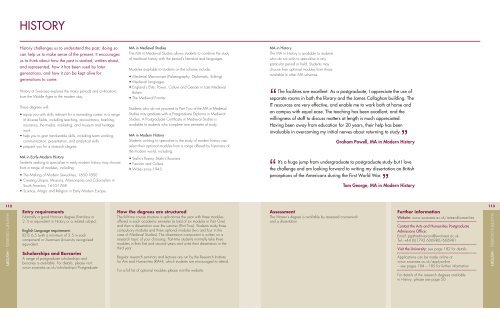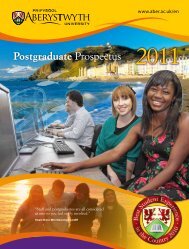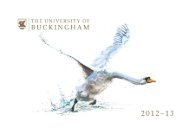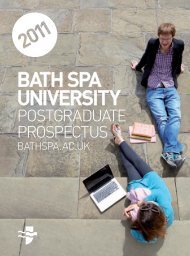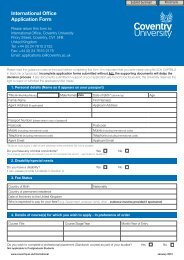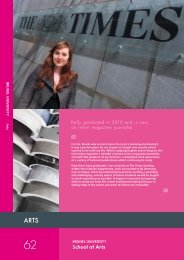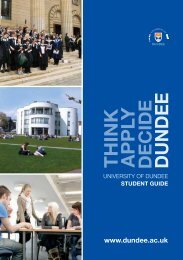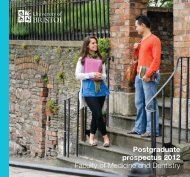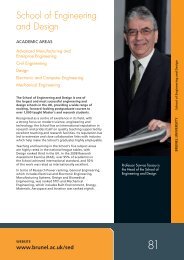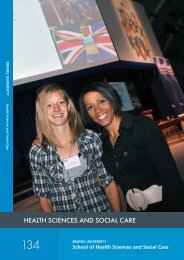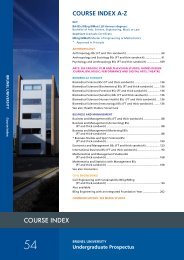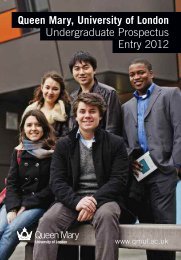www.swansea.ac.uk Postgraduate Prospectus 2012
www.swansea.ac.uk Postgraduate Prospectus 2012
www.swansea.ac.uk Postgraduate Prospectus 2012
- No tags were found...
Create successful ePaper yourself
Turn your PDF publications into a flip-book with our unique Google optimized e-Paper software.
HISTORYHistory challenges us to understand the past; doing socan help us to make sense of the present. It encouragesus to think about how the past is studied, written about,and represented, how it has been used by latergenerations, and how it can be kept alive forgenerations to come.History at Swansea explores the major periods and civilisationsfrom the Middle Ages to the modern day.These degrees will:• equip you with skills relevant for a rewarding career in a rangeof diverse fields, including te<strong>ac</strong>hing, <strong>ac</strong>countancy, banking,insurance, the media, marketing, and museum and heritagework• help you to gain transferable skills, including team working,communication, presentation, and analytical skills• prepare you for a research degree.MA in Early Modern HistoryStudents seeking to specialise in early modern history may choosefrom a range of modules, including:• The Making of Modern Sexualities, 1650-1800• Creating Utopia: Missions, Missionaries and Colonialism inSouth America, 1610-1768• Science, Magic and Religion in Early Modern Europe.MA in Medieval StudiesThe MA in Medieval Studies allows students to combine the studyof medieval history with the period’s literature and languages.Modules available to students on the scheme include:• Medieval Manuscripts (Palaeography, Diplomatic, Editing)• Medieval Languages• England’s Elite: Power, Culture and Gender in Late MedievalBritain• The Medieval Frontier.Students who do not proceed to Part Two of the MA in MedievalStudies may graduate with a <strong>Postgraduate</strong> Diploma in MedievalStudies. A <strong>Postgraduate</strong> Certificate in Medieval Studies isavailable to students who complete one semester of study.MA in Modern HistoryStudents wishing to specialise in the study of modern history canselect their optional modules from a range offered by historians ofthe modern world, including:• Stalin’s Russia, Stalin’s Russians• Fascism and Culture• Wales since 1945.MA in HistoryThe MA in History is available to studentswho do not wish to specialise in anyparticular period or field. Students maychoose their optional modules from thoseavailable in other MA schemes.“The f<strong>ac</strong>ilities are excellent. As a postgraduate, I appreciate the use ofseparate rooms in both the library and the James Callaghan building. TheIT resources are very effective, and enable me to work both at home andon campus with equal ease. The te<strong>ac</strong>hing has been excellent, and thewillingness of staff to discuss matters at length is much appreciated.Having been away from education for 20 years, their help has beeninvaluable in overcoming my initial nerves about returning to study.“Graham Powell, MA in Modern HistoryIt’s a huge jump from undergraduate to postgraduate study but I lovethe challenge and am looking forward to writing my dissertation on Britishperceptions of the Americans during the First World War.””Tom George, MA in Modern History112MASTER'S DEGREES – HISTORYEntry requirementsNormally a good Honours degree (first-class or2.1) or equivalent in History or a related subject.English Language requirement:IELTS 6.5 (with a minimum of 5.5 in e<strong>ac</strong>hcomponent) or Swansea University recognisedequivalent.Scholarships and BursariesA range of postgraduate scholarships andbursaries is available. For details, please visit:<strong>www</strong>.<strong>swansea</strong>.<strong>ac</strong>.<strong>uk</strong>/scholarships/<strong>Postgraduate</strong>How the degrees are structuredThe full-time course structure is split <strong>ac</strong>ross the year with three modulesoffered in e<strong>ac</strong>h <strong>ac</strong>ademic semester (a total of six modules in Part One)and then a dissertation over the summer (Part Two). Students study threecompulsory modules and three optional modules (two and four in thecase of Medieval Studies). The dissertation component is written on aresearch topic of your choosing. Part-time students normally take threemodules in their first and second years and write their dissertation in thethird year.Regular research seminars and lectures are run by the Research Institutefor Arts and Humanities (RIAH), which students are encouraged to attend.For a full list of optional modules please visit the website.AssessmentThe Master’s degree is available by assessed courseworkand a dissertation.Further informationWebsite: <strong>www</strong>.<strong>swansea</strong>.<strong>ac</strong>.<strong>uk</strong>/artsandhumanitiesCont<strong>ac</strong>t the Arts and Humanities <strong>Postgraduate</strong>Admissions Office:Email: pgahadmissions@<strong>swansea</strong>.<strong>ac</strong>.<strong>uk</strong>Tel: +44 (0)1792 606980/606981Visit the University: see page 182 for detailsApplications can be made online at<strong>www</strong>.<strong>swansea</strong>.<strong>ac</strong>.<strong>uk</strong>/applyonline– see pages 184 – 185 for further informationFor details of the research degrees availablein History, please see page 50.113MASTER'S DEGREES – HISTORY


